关系代词which用法说明
关系代词which用法说明

关系代词which用法说明关系代词which在句子中起着连接词的作用,用于引导从句,并在从句中担任一定成分的句子。
以下是关于关系代词which的详细用法说明:1.定语从句中引导词的选用:关系代词which可以引导定语从句,修饰先行词,并在从句中担任一定成分。
例如,“The book which I borrowed from the library is very interesting.” 在这个句子中,“which”引导了一个定语从句,修饰了“the book”,并且在从句中担任主语。
2.引导词which的省略:当关系代词which在从句中担任主语时,通常可以省略。
例如,“The book (which) I borrowed is very interesting.” 这个句子中,“which”在从句中担任主语,可以被省略。
3.which引导非限制性定语从句:除了限制性定语从句外,which还可以用于引导非限制性定语从句。
非限制性定语从句通常用来提供关于先行词的额外信息,而不是对先行词进行限制。
例如,“She has a beautiful house,which she bought l ast year.” 这个句子中的“which”引导了一个非限制性定语从句,描述了她去年买的漂亮房子。
4.修饰整个句子:在一些情况下,which可以用作关系副词,来修饰整个句子,表达特定的意思。
例如,“He won the game, which was a hugesurprise to everyone.” 这个句子中的“which”修饰了整个句子,表达了赢得比赛对每个人来说都是一个巨大的惊喜。
5.which作为关系代词和连词的区别:在某些情况下,“which”可能被用作关系代词或连词。
作为关系代词时,“which”在从句中担任成分;作为连词时,“which”则不担任任何成分,只是连接两个句子。
例如,“Hementioned a book, which I had read.” 这个句子中的“which”作为关系代词,引导一个定语从句修饰“book”。
which引导定语从句用法
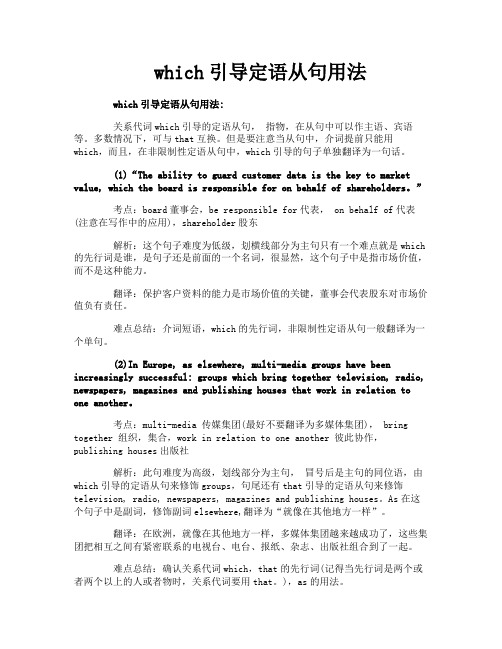
which引导定语从句用法which引导定语从句用法:关系代词which引导的定语从句,指物,在从句中可以作主语、宾语等。
多数情况下,可与that互换。
但是要注意当从句中,介词提前只能用which,而且,在非限制性定语从句中,which引导的句子单独翻译为一句话。
(1)“The ability to guard customer data is the key to market value, which the board is responsible for on behalf of shareholders。
”考点:board董事会,be responsible for代表, on behalf of代表(注意在写作中的应用),shareholder股东解析:这个句子难度为低级,划横线部分为主句只有一个难点就是which 的先行词是谁,是句子还是前面的一个名词,很显然,这个句子中是指市场价值,而不是这种能力。
翻译:保护客户资料的能力是市场价值的关键,董事会代表股东对市场价值负有责任。
难点总结:介词短语,which的先行词,非限制性定语从句一般翻译为一个单句。
(2)In Europe, as elsewhere, multi-media groups have been increasingly successful: groups which bring together television, radio, newspapers, magazines and publishing houses that work in relation to one another。
考点:multi-media 传媒集团(最好不要翻译为多媒体集团), bring together 组织,集合,work in relation to one another 彼此协作,publishing houses出版社解析:此句难度为高级,划线部分为主句,冒号后是主句的同位语,由which引导的定语从句来修饰groups,句尾还有that引导的定语从句来修饰television, radio, newspapers, magazines and publishing houses。
定语从句连接词which

定语从句连接词which定语从句连接词which用法which是定语从句的关系代词之一。
GMAT语法考试限定,which有且仅有两种用法。
一,which前面有逗号,逗号前面是个名词,which就近指代那个名词。
(1) Tankfield emailed Pea some photos, which did not cheer Pea up.which就近指代photos,定语从句中谓语动词did not cheer (Pea up)的发出者即从句主语即先行词photos,是photos没让豌豆家属高兴起来。
(2) Tankfield emailed Pea some photos, which Pea did not find interesting.which就近指代photos,photos是定语从句中的宾语,把定语从句还原成一个完整句就是Pea did not find the photos interesting.可以看到,上面两个句子都可以以that为关系代词改写,即(1)’ Tankfield emailed Pea some photos t hat did not cheer Pea up.(2)’ Tankfield emailed Pea some photos that Pea did not find interesting.改写与原版区别在哪儿?就在一个逗号。
which前面是名词,名词和which 之间没逗号的,在GMAT语法里算错。
二,which前面是介词,介词前面是名词,which就近指代介词前的那个名词,名词和介词之间有无逗号均可。
Tankfield once lent Pea a book from which Pea glimpsed the basics of genes.这个句子可以“拆”成如下两句:(每个定语从句都可以拆成两句,以先行词为拆分点)Tankfield once lent Pea a book. Pea glimpsed the basics of genes from the book.先行词实际上是定语从句中介词的宾语,这时,需要把介词提前,避免如下表达:Tankfield once lent Pea a book, which Pea glimpsed the basics of genes from. (XXX)Tankfield once lent Pea a book that Pea glimpsed the basics of genes from. (XXX)拓展:定语从句中的`that和which用法区别that和which在从句里都可以做宾语和主语,做宾语时可以省略。
which的常见用法归类

which的常见用法归类which的用法是英语学习中的一个难点,下面店铺给大家归纳它的相关用法,希望能对大家有所帮助:1、在问句中作疑问代词,在名词从句中作为连接代词用,其含义为“哪儿,哪些”.2、如果非限制性定语从句的先行词不是指主句内容,而是指具体的人、时间、地点,则不用which.3、在后置的非限制性定语从句中代替上文出现的事物或者情况(单数或复数).下面主要讲解一下在定语从句中的常见用法:一、关系代词that和which在定语从句中作主语和宾语,放在先行词和定语从句之间,起联系作用,指物时,一般情况下可互换,如:A plane is machine that/which can fly(that/which指物,做主语)The man that works in this room is a chemist(that 指人,作主语)Here is the pen that/which you lost yesterday(that/which 指物作宾语)He is the most careful boy that I know(that指人,作宾语)二、关系代词在主语从句中作主语时,从句的谓语动词的人称和数须贺先行词一致.wheat is a plant that/which is grown in the north of China.三、that、which在从句中作主语时,不能省略.作宾语时在口语中和非正式问题中经常省略.如上例1和3中的that、which都可省略.四、在定语从句中,关系代词that和which指物时,一般没有区别,但下列几种情况中不能互换:1、只能用that的情况:a、先行词被序数词所修饰时:The first thing (that) we should do is to work out a plan.b、先行词被形容词最高级所修饰时:This is one of the most exciting football games(that)I have ever seen.The nanjing yangtse river bridge is the longest bridge (that) they ever seen.c、先行词为all、everything、nothing、anything、little等不定代词(something后也可以用which):Is there anything (that) I can do for you town?That is all (that) I Know.d、在“the time when”等结构和某些事件状语中,when常被that代替,而且that往往被省略.I may leave here any time I want to.During the time I was there I visited him twice.e、当先行词中即有人又有物时:The man and the car (that)you want to see are all here .你想见的人和车斗在这.f、that 可指人,which则不能.g、 way 后面可根由that引导的定语从句,但that一般都省略:That was the way she looked after us.who is the man that is reading new paper over there?h、先行词被形容词最高级修饰时:This is the only thing (that) we can do now.He gave me the same pen (that) were written by Lu Xun?2、在下列情况下,只能用whicha、放在介词后面做介词定语时:This is the question about which we’ve had so much discussion但是,如果把介词放在从句后部.这时which 就可换为that并常省略,如上例可以改为:This is the question that we are had so much discussion about.b、在非限定性定语从句,无论指物指人,都不能用that,指物时,只能用which和其他关系代词,如:All the books there,which have beautiful pictures in them,were written by him.which的常见用法归类which的用法是英语学习中的一个难点,下面店铺给大家归纳它的相关用法,希望能对大家有所帮助:1、在问句中作疑问代词,在名词从句中作为连接代词用,其含义为哪儿,哪些.2、如果非限制性定语从句的先行词不是指主句内容,而是指具推荐度:点击下载文档文档为doc格式。
英语基础知识-which-的指代-用法
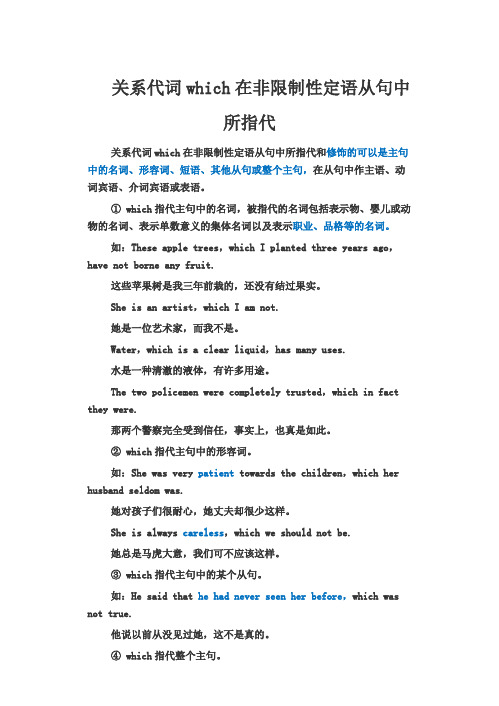
关系代词which在非限制性定语从句中所指代关系代词which在非限制性定语从句中所指代和修饰的可以是主句中的名词、形容词、短语、其他从句或整个主句,在从句中作主语、动词宾语、介词宾语或表语。
① which指代主句中的名词,被指代的名词包括表示物、婴儿或动物的名词、表示单数意义的集体名词以及表示职业、品格等的名词。
如:These apple trees,which I planted three years ago,have not borne any fruit.这些苹果树是我三年前栽的,还没有结过果实。
She is an artist,which I am not.她是一位艺术家,而我不是。
Water,which is a clear liquid,has many uses.水是一种清澈的液体,有许多用途。
The two policemen were completely trusted,which in fact they were.那两个警察完全受到信任,事实上,也真是如此。
② which指代主句中的形容词。
如:She was very patient towards the children,which her husband seldom was.她对孩子们很耐心,她丈夫却很少这样。
She is always careless,which we should not be.她总是马虎大意,我们可不应该这样。
③ which指代主句中的某个从句。
如:He said that he had never seen her before,which was not true.他说以前从没见过她,这不是真的。
④ which指代整个主句。
如:In the presence of so many people he was little tense, which was understandable.在那么多人面前他有点紧张,这是可以理解的。
which 在定语从句中的用法
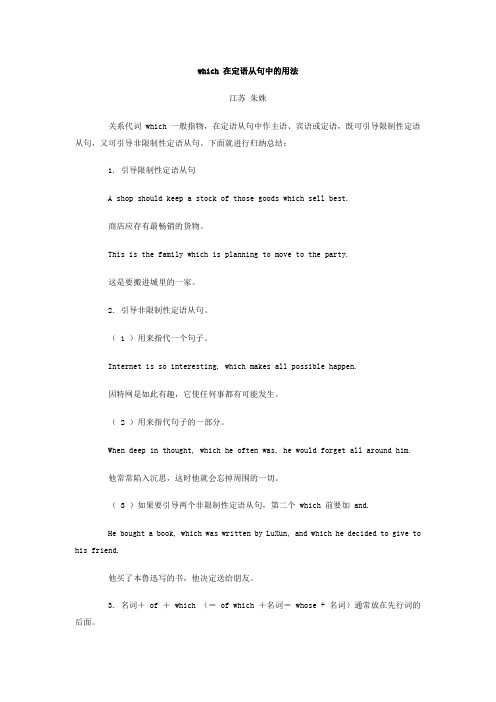
which 在定语从句中的用法江苏朱姝关系代词 which 一般指物,在定语从句中作主语、宾语或定语,既可引导限制性定语从句,又可引导非限制性定语从句。
下面就进行归纳总结:1. 引导限制性定语从句A shop should keep a stock of those goods which sell best.商店应存有最畅销的货物。
This is the family which is planning to move to the party.这是要搬进城里的一家。
2. 引导非限制性定语从句。
( 1 )用来指代一个句子。
Internet is so interesting, which makes all possible happen.因特网是如此有趣,它使任何事都有可能发生。
( 2 )用来指代句子的一部分。
When deep in thought, which he often was, he would forget all around him.他常常陷入沉思,这时他就会忘掉周围的一切。
( 3 )如果要引导两个非限制性定语从句,第二个 which 前要加 and.He bought a book, which was written by LuXun, and which he decided to give to his friend.他买了本鲁迅写的书,他决定送给朋友。
3. 名词+ of + which (= of which +名词= whose + 名词)通常放在先行词的后面。
I'd like a room the window of which looks out over the sea. / I'd like a room of which the window looks out over the sea. / I'd like a room whose window looks out over the sea.我要一间窗户面临大海的房间。
which的用法总结
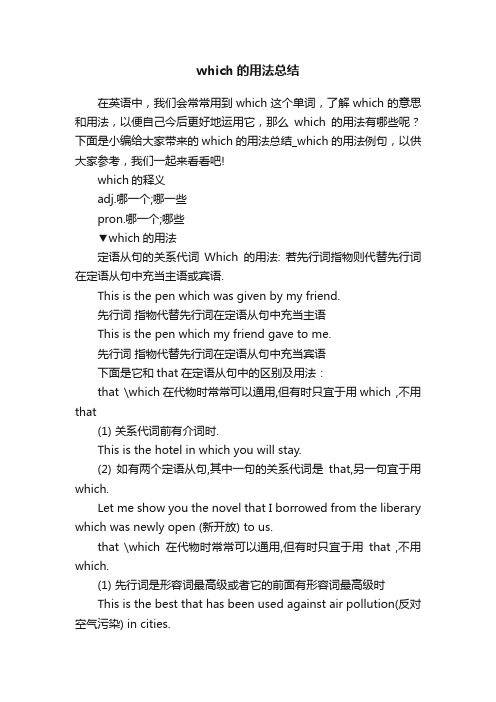
which的用法总结在英语中,我们会常常用到which这个单词,了解which的意思和用法,以便自己今后更好地运用它,那么which的用法有哪些呢?下面是小编给大家带来的which的用法总结_which的用法例句,以供大家参考,我们一起来看看吧!which的释义adj.哪一个;哪一些pron.哪一个;哪些▼which的用法定语从句的关系代词Which的用法: 若先行词指物则代替先行词在定语从句中充当主语或宾语.This is the pen which was given by my friend.先行词指物代替先行词在定语从句中充当主语This is the pen which my friend gave to me.先行词指物代替先行词在定语从句中充当宾语下面是它和that在定语从句中的区别及用法:that \which在代物时常常可以通用,但有时只宜于用which ,不用that(1) 关系代词前有介词时.This is the hotel in which you will stay.(2) 如有两个定语从句,其中一句的关系代词是that,另一句宜于用which.Let me show you the novel that I borrowed from the liberary which was newly open (新开放) to us.that \which在代物时常常可以通用,但有时只宜于用that ,不用which.(1) 先行词是形容词最高级或者它的前面有形容词最高级时This is the best that has been used against air pollution(反对空气污染) in cities.English is the most difficult subject that you will learn during these years.(2) 先行词是序数词,或它的前面有一个序数词时He is the last person that I want to see.(3) 主句中已有疑问词时Which is the bike that you lost?(4) 先行词既有人又有物时The bike and its rider that had run over (撞倒了)an old man were taken to the police station.(5) 先行词是all,much,little,something,everything,anything,nothing,none,the one等代词时You should hand in all that you have.We haven’t got much that we can offer you.I mean the one that you talked about just now.(6) 先行词前面有only,any,few,little,no,all,one of,the same,the very等词修饰时The only thing that we can do is to give you some money.Li Ming is the only one that got full marks (满分)in our class.Li Ming is one of the students that want to be teachers in our class.(7) 有两个定语从句,其中一个关系代词已用which,另外一个宜用thatEdison built up a factory(办了一个工厂) which produced things that had never been seen before.定语从句的关系副词 Where的用法:若先行词指地点且其在定语从句中充当地点状语.This is the house+I was born in the house. (=I was born there) 介词短语副词=This is the house where I was born.这就是我在那儿出生的房子.先行词关系副词in which I was born.介词+关系代词which I was born in.关系代词这里作介宾的which和that可以省略that I wos born in charge的用法:1. 用作名词,注意以下用法:(1) 表示“收费”,是可数名词,通常(但不一定)用复数形式。
which 在定语从句中的用法
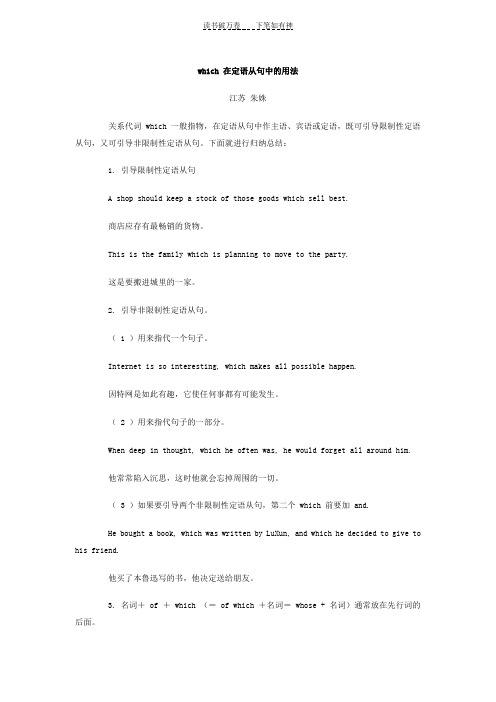
which 在定语从句中的用法江苏朱姝关系代词 which 一般指物,在定语从句中作主语、宾语或定语,既可引导限制性定语从句,又可引导非限制性定语从句。
下面就进行归纳总结:1. 引导限制性定语从句A shop should keep a stock of those goods which sell best.商店应存有最畅销的货物。
This is the family which is planning to move to the party.这是要搬进城里的一家。
2. 引导非限制性定语从句。
( 1 )用来指代一个句子。
Internet is so interesting, which makes all possible happen.因特网是如此有趣,它使任何事都有可能发生。
( 2 )用来指代句子的一部分。
When deep in thought, which he often was, he would forget all around him.他常常陷入沉思,这时他就会忘掉周围的一切。
( 3 )如果要引导两个非限制性定语从句,第二个 which 前要加 and.He bought a book, which was written by LuXun, and which he decided to give to his friend.他买了本鲁迅写的书,他决定送给朋友。
3. 名词+ of + which (= of which +名词= whose + 名词)通常放在先行词的后面。
I'd like a room the window of which looks out over the sea. / I'd like a room of which the window looks out over the sea. / I'd like a room whose window looks out over the sea.我要一间窗户面临大海的房间。
which在非限定性定语从句的用法
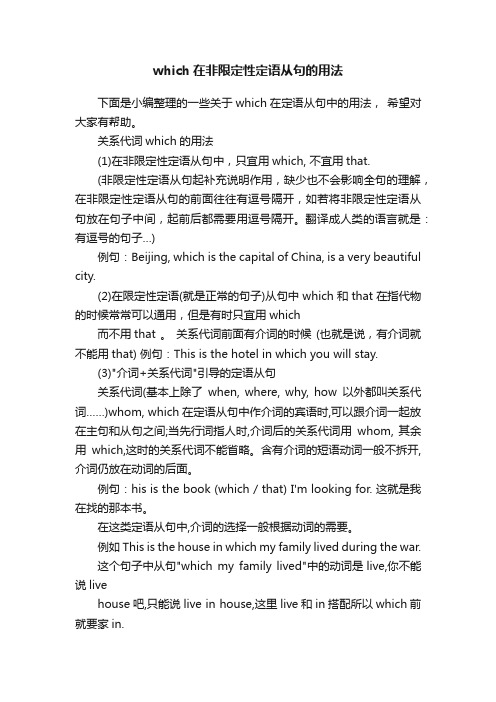
which在非限定性定语从句的用法下面是小编整理的一些关于which在定语从句中的用法,希望对大家有帮助。
关系代词which的用法(1)在非限定性定语从句中,只宜用which, 不宜用that.(非限定性定语从句起补充说明作用,缺少也不会影响全句的理解,在非限定性定语从句的前面往往有逗号隔开,如若将非限定性定语从句放在句子中间,起前后都需要用逗号隔开。
翻译成人类的语言就是:有逗号的句子…)例句:Beijing, which is the capital of China, is a very beautiful city.(2)在限定性定语(就是正常的句子)从句中which和that在指代物的时候常常可以通用,但是有时只宜用which而不用that 。
关系代词前面有介词的时候 (也就是说,有介词就不能用that) 例句:This is the hotel in which you will stay.(3)"介词+关系代词"引导的定语从句关系代词(基本上除了when, where, why, how以外都叫关系代词……)whom, which在定语从句中作介词的宾语时,可以跟介词一起放在主句和从句之间;当先行词指人时,介词后的关系代词用whom, 其余用which,这时的关系代词不能省略。
含有介词的短语动词一般不拆开,介词仍放在动词的后面。
例句:his is the book (which / that) I'm looking for. 这就是我在找的那本书。
在这类定语从句中,介词的选择一般根据动词的需要。
例如 This is the house in which my family lived during the war.这个句子中从句"which my family lived"中的动词是live,你不能说livehouse吧,只能说live in house,这里live和in搭配所以which前就要家in.(4)所以说你想要知道到底which前用不用加介词和加什么介词主要有两点:1是你要看这个从句缺不缺介词,2是要看动词与介词的固定搭配,这就是要背的了.例句:This is the girl which I like.这句就不缺介词,你可以把句子反过来看看通不通顺.反过来就是I like this girl.这个句子是对的,不缺成分,那么它也就不用加介词.This is the question about which I always think.这句就是think about 这个词组的搭配了.一般考试会出现的就是live in, think about, hold on 之类的了.只要你多练习把句子反过来就能够掌握了~。
that who which在定语从句中的用法
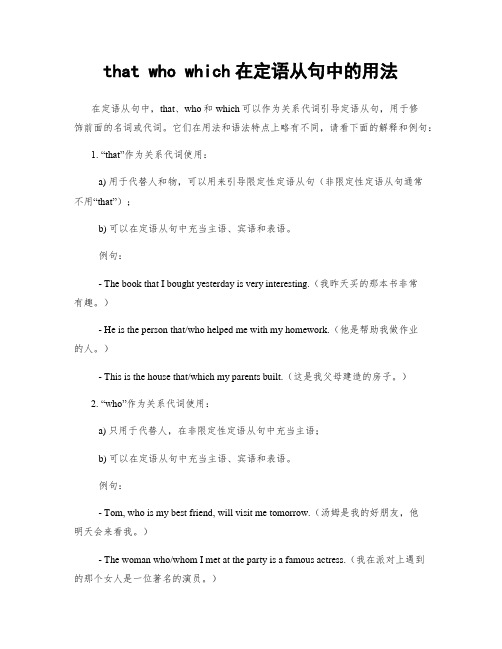
that who which在定语从句中的用法在定语从句中,that、who和which可以作为关系代词引导定语从句,用于修饰前面的名词或代词。
它们在用法和语法特点上略有不同,请看下面的解释和例句:1. “that”作为关系代词使用:a) 用于代替人和物,可以用来引导限定性定语从句(非限定性定语从句通常不用“that”);b) 可以在定语从句中充当主语、宾语和表语。
例句:- The book that I bought yesterday is very interesting.(我昨天买的那本书非常有趣。
)- He is the person that/who helped me with my homework.(他是帮助我做作业的人。
)- This is the house that/which my parents built.(这是我父母建造的房子。
)2. “who”作为关系代词使用:a) 只用于代替人,在非限定性定语从句中充当主语;b) 可以在定语从句中充当主语、宾语和表语。
例句:- Tom, who is my best friend, will visit me tomorrow.(汤姆是我的好朋友,他明天会来看我。
)- The woman who/whom I met at the party is a famous actress.(我在派对上遇到的那个女人是一位著名的演员。
)- She is the one who/whom everyone admires.(她是大家都敬仰的人。
)3. “which”作为关系代词使用:a) 只用于代替物,在非限定性定语从句中充当主语;b) 可以在定语从句中充当主语、宾语和表语。
例句:- The car, which is parked outside, belongs to my neighbor.(停在外面的那辆车属于我的邻居。
)- The book which/that I borrowed from the library is very informative.(我从图书馆借的那本书非常有启发性。
定语从句which用法归纳

定语从句which用法归纳定语从句中的“which”用法可真是个让人又爱又恨的小调皮呀!咱们今天就来好好把它给“收拾”明白。
先来说说“which”在定语从句中最常见的用法,那就是充当关系代词,指代先行词。
比如说“ The book which I bought yesterday is very interesting ”在这个句子里,“which”就指代了“book”,在从句中作宾语。
有时候“which”引导的定语从句还能对整个主句进行修饰呢!就像“ He failed the exam, which made his parents very angry ”这里的“which”指代的就是“He failed the exam”这一整个情况。
还有哦,“which”引导的定语从句和“that”引导的有时候会让人有点迷糊。
但其实也不难区分。
如果先行词是不定代词或者被不定代词修饰的时候,咱们一般就用“that”,而不是“which”。
比如说“All that is needed is a supply of oil ”这里就不能用“which”。
我想起之前教过的一个学生,他对“which”的用法总是搞不清楚。
有一次做作业,题目是“ The house which stands on the top of the hill ismine ”他居然写成了“ The house that stands on the top of the hill is mine ”我就问他为啥呀,他一脸迷茫地看着我,说感觉都差不多。
我就耐心地给他解释,“house”在这儿没有被不定代词修饰,用“which”更合适。
经过一番讲解,他终于恍然大悟,后来再遇到类似的题目就很少出错啦。
再说说“which”在非限制性定语从句中的用法。
非限制性定语从句可重要啦,它能给句子补充更多的信息,让表达更丰富。
比如说“ Tom was late for school again, which made the teacher very angry ”这里的“which”就不能换成“that”。
which的用法

which的用法
用法:
1、在后置的非限制性定语从句中代替上文出现的事物或情况(单数或复数)。
2、在问句中作为疑问代词,在名词从句中作为连接代词用,其含义为“哪个、哪些”。
3、如果非限制性定语从句的.先行词不是指主句内容,而是指具体的人、时间、地点,则不用which。
4、关系代词that 和which 在定语从句中作主语和宾语,放在先行词和定语从句之间,起联系作用。
5、which 在从句中作主语时,不能省略。
作宾语时在口语中和非正式问题中经常省略。
6、关系代词在主语从句中作主语时,从句的谓语动词的人称和数须和先行词一致。
Wheat is a plant that/which is grown in the north of China.
7、引导非限制性定语从句时,通常要用which。
She received an invitation from her boss, which came as a surprise.
她收到了老板的邀请,这是她意想不到的。
8、直接放在介词后作宾语时,通常要用which。
The tool with which he is working is called a hammer.
他干活用的那个工具叫做锤子。
which 在定语从句中的用法

which 在定语从句中的用法江苏朱姝关系代词 which 一般指物,在定语从句中作主语、宾语或定语,既可引导限制性定语从句,又可引导非限制性定语从句。
下面就进行归纳总结:1. 引导限制性定语从句A shop should keep a stock of those goods which sell best.商店应存有最畅销的货物。
This is the family which is planning to move to the party.这是要搬进城里的一家。
2. 引导非限制性定语从句。
( 1 )用来指代一个句子。
Internet is so interesting, which makes all possible happen.因特网是如此有趣,它使任何事都有可能发生。
( 2 )用来指代句子的一部分。
When deep in thought, which he often was, he would forget all around him.他常常陷入沉思,这时他就会忘掉周围的一切。
( 3 )如果要引导两个非限制性定语从句,第二个 which 前要加 and.He bought a book, which was written by LuXun, and which he decided to give to his friend.他买了本鲁迅写的书,他决定送给朋友。
3. 名词+ of + which (= of which +名词= whose + 名词)通常放在先行词的后面。
I'd like a room the window of which looks out over the sea. / I'd like a room of which the window looks out over the sea. / I'd like a room whose window looks out over the sea.我要一间窗户面临大海的房间。
which在定语从句中的作用(3篇)

第1篇导语:在英语语法中,定语从句是一种常见的从句结构,用于修饰名词或代词,提供关于该名词或代词的额外信息。
而定语从句中的关系代词“which”扮演着至关重要的角色。
本文将详细探讨“which”在定语从句中的作用,并分析其在不同语境下的使用。
一、引言定语从句是英语语法中不可或缺的一部分,它通过连接主句和从句,对名词或代词进行修饰和限定。
关系代词“which”是定语从句中最常用的关系代词之一,它引导定语从句,并在从句中充当成分。
本文将从以下几个方面展开论述:1. “which”在定语从句中的定义和用法;2. “which”在定语从句中的语法功能;3. “which”在定语从句中的语境运用;4. “which”与其他关系代词的对比。
二、定义和用法1. 定义“which”是关系代词,用于引导定语从句,对先行词进行修饰和限定。
它既可以指代名词,也可以指代整个句子。
2. 用法(1)指代名词:在定语从句中,如果先行词是名词,那么“which”可以指代该名词。
例:The book which you gave me is very interesting.你给我的那本书很有趣。
(2)指代句子:在定语从句中,如果先行词是整个句子,那么“which”可以指代该句子。
例:The story which you told me last night was fascinating.你昨晚给我讲的故事很吸引人。
三、语法功能1. 限定先行词“which”在定语从句中具有限定先行词的功能,对先行词进行修饰和限定,使先行词更加明确。
2. 充当成分“which”在定语从句中可以充当不同的成分,如主语、宾语、表语等。
(1)充当主语:当先行词是名词时,如果定语从句中的谓语动词是及物动词,那么“which”充当主语。
例:The city which you visited last week is very beautiful.你上周参观的那个城市很美。
whom和which的用法

whom和which的用法
摘要:
1.关系代词whom 和which 的定义和作用
2.whom 和which 在句子中的位置
3.whom 和which 的用法区别
4.实例解析
正文:
关系代词whom 和which 在英语中都被用来引导定语从句,用于修饰名词或代词。
它们在句子中的位置和用法有所不同。
首先,whom 用于指代人,只能作为宾语。
在句子中,它通常出现在动词之后,或者在介词之后作为介词宾语。
例如:"He is the man whom I met yesterday."(他是我昨天遇见的那个人。
)在这个例子中,whom 作为介词宾语出现在句子中。
其次,which 用于指代物,可以作为主语、宾语或者表语。
在句子中,它通常出现在逗号之后,或者在介词之前作为介词宾语。
例如:"The book, which is on the table, is mine."(那本书是我的。
)在这个例子中,which 作为定语从句的引导词,修饰前面的名词"book"。
然而,在某些情况下,whom 和which 的用法会有所重叠。
比如,当介词在从句中位于句首时,只能使用whom 作为引导词。
例如:"To whom are you talking?"(你在和谁说话?)在这个例子中,whom 引导定语从句,并且作为介词"to"的宾语。
在英语写作中,正确使用whom 和which 是非常重要的,因为它们可以帮助我们更清晰、准确地表达思想。
关系代词which用法说明
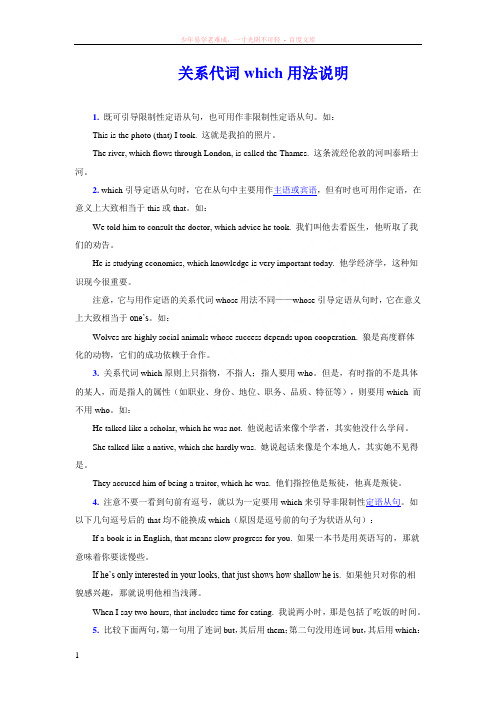
关系代词which用法说明1.既可引导限制性定语从句,也可用作非限制性定语从句。
如:This is the photo (that) I took. 这就是我拍的照片。
The river, which flows through London, is called the Thames. 这条流经伦敦的河叫泰晤士河。
2. which引导定语从句时,它在从句中主要用作主语或宾语,但有时也可用作定语,在意义上大致相当于this或that。
如:We told him to consult the doctor, which advice he took. 我们叫他去看医生,他听取了我们的劝告。
He is studying economics, which knowledge is very important today. 他学经济学,这种知识现今很重要。
注意,它与用作定语的关系代词whose用法不同——whose引导定语从句时,它在意义上大致相当于one’s。
如:Wolves are highly social animals whose success depends upon cooperation. 狼是高度群体化的动物,它们的成功依赖于合作。
3.关系代词which原则上只指物,不指人;指人要用who。
但是,有时指的不是具体的某人,而是指人的属性(如职业、身份、地位、职务、品质、特征等),则要用which 而不用who。
如:He talked like a scholar, which he was not. 他说起话来像个学者,其实他没什么学问。
She talked like a native, which she hardly was. 她说起话来像是个本地人,其实她不见得是。
They accused him of being a traitor, which he was. 他们指控他是叛徒,他真是叛徒。
which的用法

which的用法
which可引导非限制性定语从句,可直接放在介词后作宾语。
which在问句中作为疑问代词,在名词从句中作为连接代词用。
扩展资料
用法:
1、在后置的非限制性定语从句中代替上文出现的事物或情况(单数或复数)。
2、在问句中作为疑问代词,在名词从句中作为连接代词用,其含义为“哪个、哪些”。
3、如果非限制性定语从句的.先行词不是指主句内容,而是指具体的人、时间、地点,则不用which。
4、关系代词that 和which 在定语从句中作主语和宾语,放在先行词和定语从句之间,起联系作用。
5、which 在从句中作主语时,不能省略。
作宾语时在口语中和非正式问题中经常省略。
6、关系代词在主语从句中作主语时,从句的谓语动词的人称和数须和先行词一致。
Wheat is a plant that/which is grown in the north of China.
7、引导非限制性定语从句时,通常要用which。
She received an invitation from her boss, which came as a surprise.
她收到了老板的邀请,这是她意想不到的。
8、直接放在介词后作宾语时,通常要用which。
The tool with which he is working is called a hammer.
他干活用的那个工具叫做锤子。
定语从句which的意思
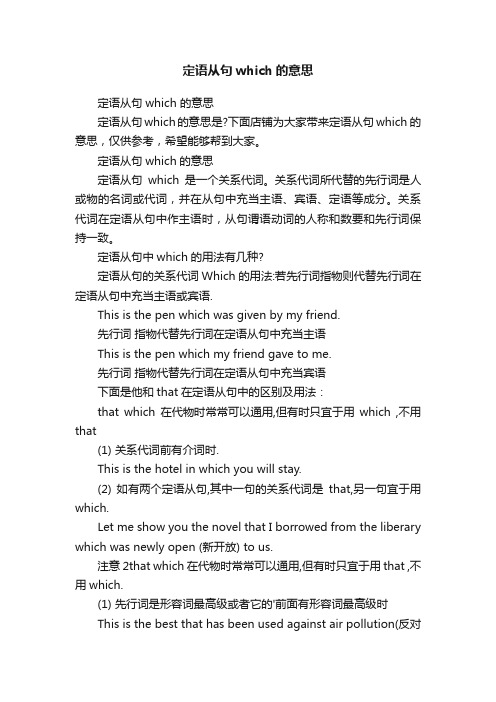
定语从句which的意思定语从句which 的意思定语从句which的意思是?下面店铺为大家带来定语从句which 的意思,仅供参考,希望能够帮到大家。
定语从句which的意思定语从句which是一个关系代词。
关系代词所代替的先行词是人或物的名词或代词,并在从句中充当主语、宾语、定语等成分。
关系代词在定语从句中作主语时,从句谓语动词的人称和数要和先行词保持一致。
定语从句中which的用法有几种?定语从句的关系代词 Which的用法:若先行词指物则代替先行词在定语从句中充当主语或宾语.This is the pen which was given by my friend.先行词指物代替先行词在定语从句中充当主语This is the pen which my friend gave to me.先行词指物代替先行词在定语从句中充当宾语下面是他和that在定语从句中的区别及用法:that which在代物时常常可以通用,但有时只宜于用which ,不用that(1) 关系代词前有介词时.This is the hotel in which you will stay.(2) 如有两个定语从句,其中一句的关系代词是that,另一句宜于用which.Let me show you the novel that I borrowed from the liberary which was newly open (新开放) to us.注意2that which在代物时常常可以通用,但有时只宜于用that ,不用which.(1) 先行词是形容词最高级或者它的'前面有形容词最高级时This is the best that has been used against air pollution(反对空气污染) in cities.English is the most difficult subject that you will learn during these years.(2) 先行词是序数词,或它的前面有一个序数词时He is the last person that I want to see.(3) 主句中已有疑问词时Which is the bike that you lost?which和that的区别?which与that两者都可指物,常可互换。
从句中which的的正确用法是什么

从句中which的的正确⽤法是什么 定语从句的关系代词Which若先⾏词指物则代替先⾏词在定语从句中充当主语或宾语,以下是由店铺⼩编整理关于从句中which的⽤法的内容,希望⼤家喜欢! 从句中which的⽤法 This is the pen which was given by my friend. 先⾏词指物代替先⾏词在定语从句中充当主语 This is the pen which my friend gave to me. 先⾏词指物代替先⾏词在定语从句中充当宾语 下⾯是他和that在定语从句中的区别及⽤法: that \which在代物时常常可以通⽤,但有时只宜于⽤which ,不⽤that (1) 关系代词前有介词时. This is the hotel in which you will stay. (2) 如有两个定语从句,其中⼀句的关系代词是that,另⼀句宜于⽤which. Let me show you the novel that I borrowed from the liberary which was newly open (新开放) to us. 注意2that \which在代物时常常可以通⽤,但有时只宜于⽤that ,不⽤which. (1) 先⾏词是形容词最⾼级或者它的前⾯有形容词最⾼级时 This is the best that has been used against air pollution(反对空⽓污染) in cities. English is the most difficult subject that you will learn during these years. (2) 先⾏词是序数词,或它的前⾯有⼀个序数词时 He is the last person that I want to see. (3) 主句中已有疑问词时 Which is the bike that you lost? (4) 先⾏词既有⼈⼜有物时 The bike and its rider that had run over (撞倒了)an old man were taken to the police station. (5) 先⾏词是all,much,little,something,everything,anything,nothing,none,the one等代词时 You should hand in all that you have. We haven’t got much that we can offer you. I mean the one that you talked about just now. (6) 先⾏词前⾯有only,any,few,little,no,all,one of,the same,the very等词修饰时 The only thing that we can do is to give you some money. Li Ming is the only one that got full marks (满分)in our class. Li Ming is one of the students that want to be teachers in our class. (7) 有两个定语从句,其中⼀个关系代词已⽤which,另外⼀个宜⽤that Edison built up a factory(办了⼀个⼯⼚) which produced things that had never been seen before. 定语从句的关系副词 Where的⽤法:若先⾏词指地点且其在定语从句中充当地点状语. This is the house+I was born in the house.(=I was born there) 介词副词 =This is the house where I was born.这就是我在那⼉出⽣的房⼦. 先⾏词关系副词 in which I was born. 介词+关系代词 which I was born in. 关系代词 这⾥作介宾的which和that可以省略 that I was born in which的⼀般⽤法 1、在后置的⾮限制性定语从句中代替上⽂出现的事物或情况(单数或复数)。
- 1、下载文档前请自行甄别文档内容的完整性,平台不提供额外的编辑、内容补充、找答案等附加服务。
- 2、"仅部分预览"的文档,不可在线预览部分如存在完整性等问题,可反馈申请退款(可完整预览的文档不适用该条件!)。
- 3、如文档侵犯您的权益,请联系客服反馈,我们会尽快为您处理(人工客服工作时间:9:00-18:30)。
关系代词which用法说明1.既可引导限制性定语从句,也可用作非限制性定语从句。
如:This is the photo (that) I took. 这就是我拍的照片。
The river, which flows through London, is called the Thames. 这条流经伦敦的河叫泰晤士河。
2. which引导定语从句时,它在从句中主要用作主语或宾语,但有时也可用作定语,在意义上大致相当于this或that。
如:We told him to consult the doctor, which advice he took. 我们叫他去看医生,他听取了我们的劝告。
He is studying economics, which knowledge is very important today. 他学经济学,这种知识现今很重要。
注意,它与用作定语的关系代词whose用法不同——whose引导定语从句时,它在意义上大致相当于one’s。
如:Wolves are highly social animals whose success depends upon cooperation. 狼是高度群体化的动物,它们的成功依赖于合作。
3.关系代词which原则上只指物,不指人;指人要用who。
但是,有时指的不是具体的某人,而是指人的属性(如职业、身份、地位、职务、品质、特征等),则要用which而不用who。
如:He talked like a scholar, which he was not. 他说起话来像个学者,其实他没什么学问。
She talked like a native, which she hardly was. 她说起话来像是个本地人,其实她不见得是。
They accused him of being a traitor, which he was. 他们指控他是叛徒,他真是叛徒。
4.注意不要一看到句前有逗号,就以为一定要用which来引导非限制性定语从句。
如以下几句逗号后的that均不能换成which(原因是逗号前的句子为状语从句):If a book is in English, that means slow progress for you. 如果一本书是用英语写的,那就意味着你要读慢些。
If he’s only interested in your looks, that just shows how shallow he is. 如果他只对你的相貌感兴趣,那就说明他相当浅薄。
When I say two hours, that includes time for eating. 我说两小时,那是包括了吃饭的时间。
5.比较下面两句,第一句用了连词but,其后用them;第二句没用连词but,其后用which:She wrote a lot of novels, but none of them were popular.=She wrote a lot of novels, none of which were popular. 她写过许多本小说,但没有一本是受欢迎的。
6.有时可以见到“介词+关系代词+不定式”这样的结构(可视为一种紧缩的定语从句)。
比较:She must have time in which to grow calm.=She must have time in which she can grow calm. 她必须有冷静下来时的时间。
She had some money in the bank, with which to help her mother.=She had some money in the bank, with which she could help her mother. 她银行里有些钱用来帮助她的母亲。
值得指出的是,这类结构中的介词不能没有,并且该介词也不能位于不定式后面,比较:There the children had a garden in which to play.(很正式)There the children had a garden in which they could play.(较正式)There the children had a garden to play in.(较口语化)在那儿孩子们有个可以玩耍的花园。
但是不能说:There the children had a garden which to play in.7.有时可见到由which引导的非限制性定语从句单独成句。
如:Mary is enormously respected. Which is not to say you are not an exceptionally able lady. 玛丽非常受尊重,但这并是说你不是一位极为能干的女士。
st of them与most of which的区别在哪请看下面的题,是填them还是which:He wrote a lot of novels, most of _________ were popular.A. themB. whom D. that D. which【分析】此题最佳答案为D,但很容易误选A。
假若单独看He wrote a lot of novels和Most of them were popular 这两句话,它们并不错,但将它们放在一起用逗号连接就不甚妥当了。
因为,英语句子按其结构来划分,可分为简单句、并列句、复合句和并列复合句四种,也就是说,一个规范的英语句子,从结构上说,它必须隶属以上四类句型之一。
但上面一题若选A,则它既不是简单句(因为它有两个主谓结构),也不是并列句(因为它没有并列连词),也不是复合句(因为它没有主从句之分),当然它更不是并列复合句,所以选A是错误的。
可以选D,是因为空白处填了which 之后,后一句即成了一个非限制性的定语从句,前一句即为主句,整个句子即为一个复合句。
比较以下各句:(1) He wrote a lot of books, and most of them were popular.句中用了并列连词,整个句子为并列句。
(2) He wrote a lot of books, most of which were popular.后一句用了which,使之成为定语从句,整个句子为复合句。
(3) He wrote a lot of books, most of them being popular.后一句用了非谓语动词being,故逗号处不用并列连词,整个句子为简单句。
关系副词where用法归纳关系副词when主要用于修饰表示地点的名词,同时它在定语从句中用作时间状语。
如:This is the village where he was born. 这就是他出生的村子。
That’s the hotel where we were staying last summer. 这就是我们去年夏天住的旅馆。
Barbary was working in Aubury, where she went daily in a bus. 巴巴拉在奥伯里工作,每天得坐公共汽车去上班。
与前面when的情况一样,注意不要一见到先行词为地点名词,就以为一定要用关系副词where来引导定语从句,同时还要看它在定语从句中充当什么成分——如果在定语从句中用作地点状语,就用where;如果在定语从句中不是用作时间状语,而是用作主语或宾语,那就不能用where,而要用that, which等。
如:He works in a factory that [which] makes TV sets. 他在一家电视机厂工作。
关系代词that / which在定语从句中用作主语。
另外注意,where有时还可用于抽象名词后引导定语从句。
如:We have reached a point where a change is needed. 我们到了必须改一改的地步。
There are cases where the word “mighty” is used as an adverb. 在一些情况下,mighty 一词可用作副词。
He got into a situation where it is hard to decide what is right and wrong. 他陷入一种难以分辨是非的局面。
I don’t want a job where I’m chained to a desk all day. 我不想找一份整天坐办公桌前的工作。
of whom和of which用法归纳1. of表示同位关系:即用于在A+of+B结构,其中的A和B为同位关系。
如:Her sons, both of whom work abroad, ring her up every week. 她的两个儿子,都在国外工作,他们每周都给她打电话来。
We’ve tested three hundred types of boot, none of which is completely waterproof. 我们已经测试过300种靴子,没有一种是完全防水的。
2. of表示整体与部分的关系:即用于“部分+of+整体(which, whom)”结构。
如:He went with a group of people, few of whom were correctly equipped for such a climb. 他和一队人一起去了,其中没有几个人配有进行这样一次登山的适当装备。
The buses, most of which were already full, were surrounded by an angry crowd. 公共汽车大多数都已经挤满了人,它们被愤怒的人群包围着。
I met the fruit-pickers, several of whom were university students. 我遇到了摘水果的人们,其中有几个人是大学生。
3. of表示所属关系:即of用于构成所有格。
如:He’s written a book the name of which I’ve forgotten. 他写了一本书,书名我给忘了。
The house the roof of which was damaged has now been repaired. 那幢屋顶被损坏的房子现在已经修好了。
4. of与其他的词构成固定搭配:即of与从句中的某个词语构成固定搭配。
